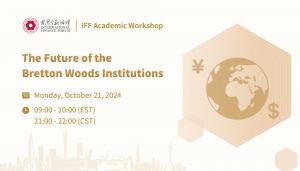The panel featured experts including Zhu Xian, IFF Executive Vice President and former Vice President of the World Bank; Gerry Rice, IFF Vice President and former Spokesperson of the IMF; and Siddharth Tiwari, IFF Vice President and former Chief Representative at the Bank for International Settlements, among others. Lin Jianhai, IFF Executive Vice President, opened by contrasting the world of 1944 with today's complexities. Originally focused on financial stability and growth, the IMF and World Bank must now address low growth, high debt, shifting demographics, and climate change. Among the other participants in the event were Zhang Liqing, IFF Academic Committee Member and Professor of International Economics and the Director of Center for International Finance Studies, Central University of Finance and Economics; and Song Min, IFF Academic Committee Member and former Dean of Economics and Management School of Wuhan University.
Revisiting the Vision of Bretton Woods
Lord Mark Malloch-Brown, former Deputy Secretary-General of the United Nations, delivered the keynote on the "Bretton Woods @80" Initiative. He reflected on the institutions' role in fostering global economic expansion, but warned of recent "alarming trends" like declining life expectancy, rising poverty, and reduced educational attainment. These issues, driven by crises such as the 2007-2008 financial crash, climate change, and demographic shifts, have left a "polycrisis" that requires coordinated action.
Malloch-Brown emphasized the importance of restoring shared ownership of these institutions. He argued that in a multipolar world, the IMF and World Bank must work towards being universal entities. "Whether you live in Ghana, China, or the United States, you should feel these are our institutions," he stressed. He also noted a paradox: developing nations are encouraged to incur more debt to reduce inequality and foster green growth, yet these countries remain wary of accumulating additional financial burdens.
Highlighting a trend towards state-led development models and economic nationalism, Malloch-Brown pointed to the upcoming U.S. presidential election. This shift in focus towards domestic policies could impact global trade and economic policies, with the potential to affect Bretton Woods institutions as well.
Adapting to New Realities
During the session, Malloch-Brown discussed the role of Special Drawing Rights (SDRs) in climate financing. He noted that for SDRs to help fund climate mitigation, wealthier countries must agree to reallocate their resources to aid poorer nations. He also addressed RMB internationalization, stating that for the Yuan to gain global status, China must enhance transparency and institutional strength—essential features that propelled currencies like the U.S. dollar to prominence.
When asked about cryptocurrency's role as a potential substitute for the Bretton Woods system, Malloch-Brown expressed skepticism. He argued that decentralized digital currencies lack the capacity for the nuanced policy decisions required in global finance. He emphasized that while technology evolves, human-managed institutions will continue to be crucial.
On the subject of artificial intelligence (AI), he recognized both opportunities and risks. AI has the potential to help developing nations leapfrog stages of development but also poses risks to employment, including white-collar sectors. The IMF and World Bank are actively studying these implications to prepare for the broader economic transformations that AI may bring.
The Path Forward
Malloch-Brown argued that completely replacing the IMF and World Bank is impractical; rather, these institutions need to adapt to the new power dynamics. By incorporating new stakeholders and embracing consensus-based reforms, they can remain effective in a distributed power structure.
Lin Jianhai concluded the forum by quoting John F. Kennedy: "Those who look only to the past or present are certain to miss the future." He underscored the urgency of adapting the Bretton Woods Institutions to address contemporary global challenges. The "Bretton Woods @80" Initiative aims to anticipate long-term economic trends, evolve multilateralism, and redefine the IMF and World Bank's roles to stay relevant.
The forum participants agreed that while the world has changed dramatically since 1944, international cooperation remains essential. By embracing shared ownership and adapting to new global realities, the Bretton Woods Institutions can continue to promote financial stability and inclusive growth. The way forward will require collaboration, transparency, and rethinking traditional approaches to serve a diverse and interconnected world more effectively.
www.ifforum.org
X (Twitter): https://x.com/IFF_F20
Facebook: https://www.facebook.com/profile.php?id=100077311990814
LinkedIn: https://www.linkedin.com/company/international-finance-forum-iff-/
Yixin Sui
International Finance Forum
email us here
Legal Disclaimer:
EIN Presswire provides this news content "as is" without warranty of any kind. We do not accept any responsibility or liability for the accuracy, content, images, videos, licenses, completeness, legality, or reliability of the information contained in this article. If you have any complaints or copyright issues related to this article, kindly contact the author above.
© 2024 Benzinga.com. Benzinga does not provide investment advice. All rights reserved.
Comments
Loading...
Benzinga simplifies the market for smarter investing
Trade confidently with insights and alerts from analyst ratings, free reports and breaking news that affects the stocks you care about.
Join Now: Free!
Already a member?Sign in

